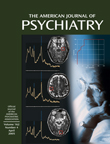Platelet Serotonin Reuptake Inhibition and Response to SSRIs in Depressed Adolescents
Abstract
OBJECTIVE: The authors examined platelet serotonin reuptake inhibition and response to selective serotonin reuptake inhibitor (SSRI) treatment in depressed adolescents. METHOD: Twenty-three depressed adolescents participating in pharmacokinetic studies of SSRIs had platelet serotonin reuptake measured before and after 14–28 days of treatment. The Clinical Global Impression (CGI) improvement rating was determined on the basis of all clinical information and was performed blind to the platelet data. RESULTS: Improvement in depressive symptoms as rated with the CGI improvement subscale was significantly associated with the percentage change in platelet serotonin reuptake inhibition from pre- to posttreatment. Improvement in depression was also associated with absolute decrease in platelet serotonin reuptake when adjusted for the magnitude of baseline reuptake. CONCLUSIONS: Platelet serotonin reuptake inhibition may be an appropriate surrogate biological marker for the pharmacodynamic activity of SSRIs in depressed adolescents.



